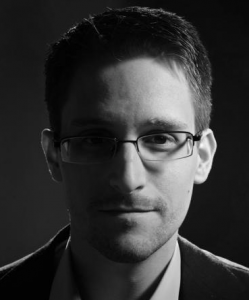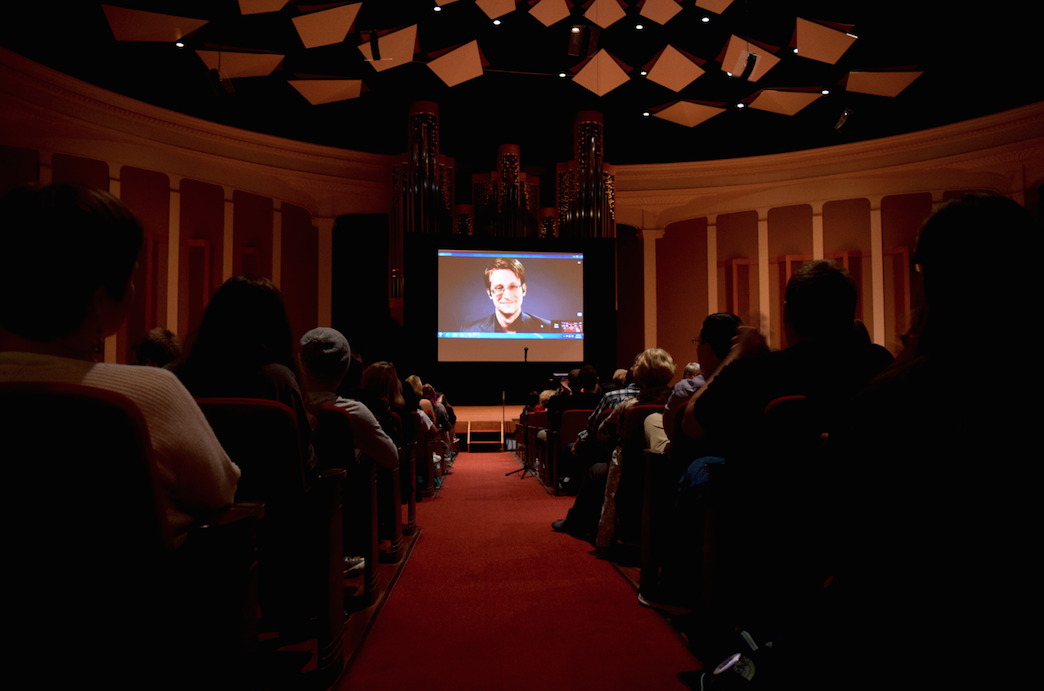By Courtney Dunne, Editor-in-Chief and Areena Arora, Managing Editor
Wednesday, Sept. 28 was not a typical day at OWU. Edward Snowden joined the OWU community for a video conversation.
Snowden, former National Security Agency (NSA) contractor, appeared before an audience of OWU students, faculty, staff and Delaware residents from an unconfirmed location in Moscow, Russia via Google Hangouts in University Hall’s Gray Chapel.

In 2013, Snowden came under light for leaking classified NSA documents to journalists that brought forth the NSA’s detailed plans of citizen surveillance and metadata collection. The U.S. government indicted Snowden on charges of theft and under the Espionage Act of 1917. He is currently in asylum in Russia.
He talked about the process of gaining special privilege security access and problems with mass citizen surveillance. He said the process heightened post 9/11 as part of NSA’s efforts to locate sleeper cells in the country.
Snowden was invited to speak at OWU as part of this year’s Sagan National Colloquium Series “Data in our Lives.” Craig Jackson and Sean McCulloch, associate professors of math and computer science, contacted Snowden through an anonymous agency. The idea to get Snowden was Jackson’s.
McCulloch said, “The fact that we invited him should not [be] construed as we’re agreeing with him or endorsing him.”
Jackson said, “[The agency doesn’t] advertise that they represent Edward Snowden, so I cannot share their information.”
The agents, according to Jackson, are a U.S. based speakers bureau. He said, “I don’t know that I want to be too specific … there is not a well documented way to [contact Snowden] … It’s kind of an open secret. If you read about [Snowden], the legal process, who is representing him both in the U.S. and abroad, it becomes pretty clear who you should talk to … Even if you don’t talk to the right people in the beginning, you can get there.”
Just like other speakers in the series, Snowden was paid. The amount was undisclosed, as part of the contract with the agency. However, according to Jackson, the total budget for the entire Sagan series is $30,000.
McCulloch said, “It’s legal to pay him … We’re also not writing a check to him directly.”
Jackson added, “You work through the agent and agent pays the speaker, of course they take a bit off the top … And we are paying Snowden’s agents.”
Jackson said they learned on Sept. 23 that the administration had decided not to do any publicity for this event. He said, “They had done publicity for our other events … they had decided not to do press releases for this event.”
Jackson said, “Sean [McCulloch] and I had a conversation with University Communications about this and we compromised a little bit … because of that conversation, they did end up sending out a press release.” He added, “Word did get out, it just didn’t get out as soon as I would’ve liked it to.”
A press release, was sent out by Cole Hatcher, director of media and public relations on Sept. 26. The press release was shared with about 40 contacts, including, but not limited to, The Associated Press, Delaware Gazette and The Columbus Dispatch, according to Hatcher.
McCulloch said, “It’s not prominent on the website as we think it ought to be … This could’ve been a much bigger deal.”
Jackson said they appreciate the help they got from the Communications Office. “It’s just on this one event we didn’t get as much help as we wanted,” he said.
He said, “This is a controversial speaker. Many people believe he is a villain, a traitor … there’s nothing illegal about what we are doing … but [they] disagree with our choice to invite him and because of that they were vocal about it … The word that came to us, was that it included at least some of the trustees of the university.”
Snowden was the best source of information about data and national security because people currently employed by NSA are not at liberty to discuss their work in detail, while Snowden is very open about how metadata is used for private citizen surveillance, according to Jackson.
President Rock Jones said, “I have heard from individuals who are quite pleased that Edward Snowden is participating in the Sagan National Colloquium and from individuals who are concerned about his participation. As always, I believe it is important for the campus to engage in thoughtful conversation on topics of importance and with individuals who represent a variety of perspectives.”
Board of Trustees member Gregory Moore ‘76 said, “I’m not aware of any trustee being aware or unhappy with it. I’d be surprised if that’s the case … I have not received any communication about it nor did I expect to … [Trustees are] not generally notified of such events on a vibrant college campus.”
He also said he believes in bringing in a variety of viewpoints to OWU and said with Snowden being in the news lately, timing could not have been better.
While the two-hour talk was streamed live on OWU’s website, it was not archived, per the conditions of the contract with the agency.
A Q&A session followed the talk. Several audience members asked questions about private companies’ data collection, the first amendment and actions private citizens can take, among others.
Snowden remains engaged in conversations around government and mass surveillance, where he currently serves on the board of directors for the Freedom of the Press Foundation.
